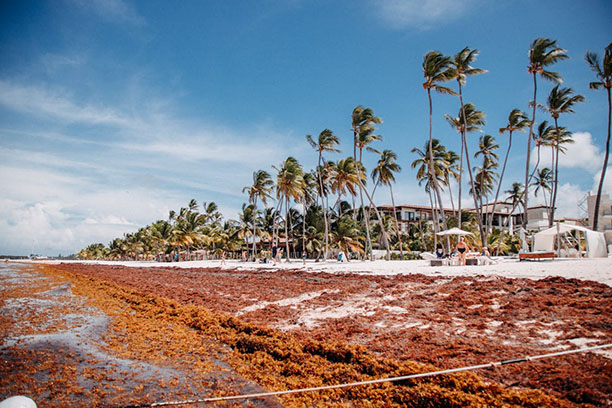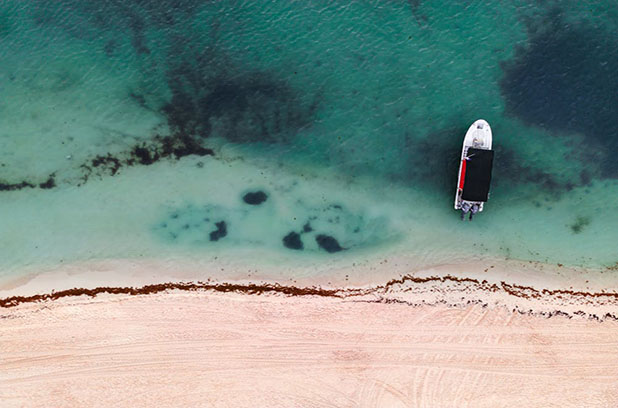
Subscribe and Get a Free Copy
Enter your details below to subscribe for free to our newsletter.

Enter your details below to subscribe for free to our newsletter.

A growing public recognition of the effects of climate change is shaping the future of Zanzibar in both environmental conservation and climate change adaptation. It is clear that the peril and promise of record-breaking temperatures, sea-level rise, depleting level of water tables a clear testimony that climate change has caused havoc in Zanzibar – from extreme heat conditions to predictability of rainfall to weather conditions.
Studies conducted by the government institutions and private sector indicate that climate variability has caused prolonged dry periods and unpredictable rainfall pattern making crop cultivation unproductive. It is clear that Zanzibar’s economy is very dependent on the climate: a large proportion of GDP, employment and livelihoods are associated with climate sensitive activities (in coastal, agriculture and tourism sectors).

Notably, climate change in Zanzibar hits three main areas – sea water intrusion, disappearance of species-both flora and fauna-and emerging up of alien species which scientists believe that the alien species disturb the ecosystem, and to a large extent, local inhabitant species.
“As climate change accelerates, we must continue to invest in making our community defense and response systems more resilient,” says Mr. Mbarouk Mussa Omar, Executive Director of Community Forests of Pemba (CFP), a CSO in charge of environmental conservation in Pemba.
Mr. Mbarouk said CFP has planted millions of mangroves in order to replenish grey-zones affected by climate change largely due to sea water intrusion whereby paddy farmers in Mkoani, Chake-Chake and Wete, north part of Pemba Islands have been adversely affected and posing other side effects like looming food security caused by low yield of rice production, the main staple food in the Islands of Zanzibar.
Mr. Mbarouk added that the Island of Pemba has been hit by severe drought caused by drastic fall of rains, sea water intruded to historical sites like Mkumbuu while farmers have been pushed out of their traditional farm lands to move to non-fertile areas. On top of that sea water invades to residential homes of local residents as Kiuyu Minungwini, and Ndagoni are consistently hit hard, said Mbarouk.
As a result, Mr. Mbarouk said production of fruits dwindle, water table depletes and extinction of ancients’ birds is visible as a result of climate change but surprisingly, the invasion of pesticides, and alien species are also notable because native species disappear due to human-induced activities. Popular flying foxes in Pemba had its number also decreases. Mr. Mbarouk suggested that the only way out to mitigate any possible catastrophe is to plant trees, change of tactics in our agricultural system; tree planting offers a simple, accessible, low-tech idea with wide appeal. He said “We need to embrace agroforestry that involves growing trees, shrubs and vegetables”, said Mr. Mbarouk. It is widely believed trees are the most efficient carbon-capture machines on the planet. Through photosynthesis, they absorb carbon dioxide, the greenhouse gas that traps heat in the environment, and turn it into energy. That energy creates new leaves, longer stems and more mass — locking away carbon
Climate change is heating the oceans and altering their chemistry so dramatically that it is threatening seafood supplies, fueling cyclones and floods and posing profound risks to the hundreds of millions of people living along the coasts, according to the United Nations (2019).
Globally, there are concerted efforts to avert effects of climate change. There are international treaties and agreements. The report concludes that the world’s oceans and ice sheets are under such severe stress that the fallout could prove difficult for humans to contain without steep reductions in greenhouse gas emissions.
In Zanzibar, there are reports that fish populations are already declining in many areas as warming waters throw marine ecosystems into disarray, and deter putting it severe stress to the economy and environment as rising sea temperatures can affect tourism and disrupt fishing as some species seek cooler waters.
Record-breaking temperatures, storms, floods, drought and wildfires are striking with increasing intensity across the world, with low-income communities; indigenous peoples living along the coastlines of Zanzibar are the most vulnerable to climate impacts. Slow-onset disasters such as sea level rise, glacier melts, ocean acidification and desertification are also driving forced migration, hunger and other human health disasters.
For instance, some farmers in Pemba have been forced to migrate from their traditional arable lands of paddy farming due to sea water intrusion, said Mbarouk of Community Forests of Pemba (CFP). What I can say is that “Ecosystems are changing, food webs are changing, fish stocks are changing, and this turmoil is affecting humans.” Hotter ocean temperatures, combined with rising sea levels, further imperil coastal regions, the report says, worsening a phenomenon that is already contributing to decline in seaweed production, a product largely produced by women.
Data shows that seaweed production remains as unstable due to erratic weather pattern and warm temperature. In 2022, Zanzibar produced 13,972 tons of sea weed worth 150/- billion against 13,323 tons in 2023 with earnings of 13/bn. This is a clear testimony that rising ocean temperatures challenge women seaweed farmers in Zanzibar, their production and value incomes as it justifies that around the world, women are the primary victims of climate change’s consequences.
Climate change adaptation refers to actions that help reduce vulnerability to the current or expected impacts of climate change like weather extremes and hazards, sea-level rise, biodiversity loss, or food and water insecurity.
Despite the breadth and magnitude of the problems, the government has commissioned several studies to identify areas affected by climate change and its mitigation, to replenish areas affected by salt water inundation.
Extreme weather events as a results of human-induced climate change have become a topic of increasing concerns in recent years. The Office of the First Vice President in Zanzibar had conducted a study which identifies 150 plus areas affected by sea water intrusion in Unguja and Pemba, according to Mr. Sheha Mjaja Juma, Director General of the Zanzibar Environmental Management Authority (ZEMA).
“As climate change accelerates, we must continue to invest in making our community defense and response systems more resilient”, says Mr. Mjaja, adding that changes in the ocean also threatens to disrupt the complex and often delicate ecosystems that underpin marine environments, noted Mr. Sheha citing the report commissioned by his office.
The effects of climate change in Zanzibar are profound and multifaceted, impacting both the environment and the livelihoods of its inhabitants.
Impact on Agriculture
The agricultural sector, which is crucial for food security and employment, faces challenges from changing weather patterns. Crop yields may decline due to inconsistent rainfall, increased pests, and changing climate conditions. Altered precipitation patterns can lead to droughts and water shortages in some areas, while others may experience intense flooding. These changes affect agricultural productivity, food security, and water availability.
Sixty years ago, when Mzee Ali Juma Suleiman of Cheju-Zanzibar opened his small paddy-mill in Cheju, the place climate was ideal for producing the rice. This is no longer the case, says Mr. Ali who, alongside his family members runs the mill, which today has its own small rice farms as well as the mill. With average annual temperatures climbing and rainfall dwindling, growing paddy and turning them into rice is becoming increasingly difficult.
For millennia, food production and pricing have been disrupted by the weather, with one-off events such as heat waves, droughts, flooding cutting harvests and raising prices. Throughout the Islands, reduced yields and higher input costs for paddy producers have pushed up prices to 20-times high this year. The production problems are only going to get worse as the effects of climate become more acute, predicts Mzee Ali.
Impact on Tourism
The impact of climate change on tourism in Zanzibar is significant as the island’s economy heavily relies on its natural beauty, coastal attractions, and biodiversity. Climate change is already affecting key elements that draw visitors, such as coral reefs, beaches, and weather patterns.
Rising Sea Levels and Coastal Erosion: rising sea levels are causing coastal erosion, which threatens beachside resorts, infrastructure, and coastal communities. This reduces the appeal of beachfront locations and increases the cost of maintaining tourism facilities.
Coral Bleaching: The island’s coral reefs, which are a major draw for diving and snorkeling enthusiasts, are under threat from rising sea temperatures. Coral bleaching events, driven by these temperature increases, are damaging the vibrant marine ecosystems around Zanzibar, making underwater tourism less attractive.
Biodiversity Loss: Zanzibar is known for its unique wildlife, including endangered species like the Zanzibar Red Colobus Monkey. Habitat destruction due to climate change affects wildlife, reducing biodiversity and impacting eco-tourism. Visitors drawn to the island’s natural landscapes may find fewer opportunities for wildlife viewing.
Public Health Concerns
The intersection of climate change and public health poses several threats to the well-being of populations, particularly through the spread of diseases, food security issues, and the worsening impact of natural disasters. Spread of Vector-Borne Diseases: Climate change leads to shifts in temperature and rainfall patterns, which affect the habitats of disease-carrying vectors such as mosquitoes. warmer temperatures and higher humidity extend the breeding season of mosquitoes, leading to a rise in diseases such as malaria and dengue fever.
Heat-Related Illnesses: Rising temperatures due to global warming increase the likelihood of heatwaves, which cause heat stress, dehydration, and other heat-related illnesses, particularly among vulnerable populations such as children, the elderly, and those with pre-existing health conditions. With Zanzibar’s already warm climate, rising temperatures could push heat levels to dangerous extremes during certain times of the year.
Respiratory Issues from Poor Air Quality: As global temperatures rise, air pollution from natural sources like dust, and man-made sources such as emissions from industries and vehicles, become more concentrated. Poor air quality exacerbates respiratory conditions like asthma and bronchitis.
Mental Health Impacts: The psychological effects of climate change are often overlooked but are becoming increasingly evident. Displacement due to flooding, the destruction of livelihoods (such as in agriculture or fishing), and the trauma from natural disasters can contribute to anxiety, depression, and stress within affected communities.
With the depth of climate change problem and recognition of the urgency of addressing climate change by the Zanzibar government, Zanzibar has implemented several measures to mitigate its impacts. These measures involve government initiatives, community engagement, and partnerships with international organizations.
To further address the climate change problem in Zanzibar, several additional steps could be taken:
Strengthening National Climate Change Strategy: Zanzibar has developed and adopted a National Climate Change Strategy to guide the integration of climate change considerations into planning and development. This strategy outlines priorities for adaptation and mitigation. Enforcing stricter regulations on carbon emissions, deforestation, and unsustainable agricultural practices would create a structured and accountable approach to managing climate risks, leading to a more sustainable and resilient Zanzibar.
Green Infrastructure Development: Ensuring that future development projects incorporate sustainable design principles such as green spaces, energy-efficient buildings, and rainwater harvesting systems. In a country like Zanzibar, which is actively promoting investment in tourism, the blue economy, and real estate, green infrastructure development offers numerous benefits that align with sustainable growth and environmental protection. It positions Zanzibar as a forward-thinking, eco-friendly investment destination, ensuring sustainable growth while protecting the island’s natural beauty, strengthening its resilience to climate change, and securing long-term prosperity for its people.
Collaboration with International Partners: Strengthening collaborations with international partners would not only provide Zanzibar with the financial, technical, and institutional support it needs to mitigate and adapt to climate change, but also empower the island to develop sustainably. By working together, Zanzibar can more effectively address its climate challenges, protect its natural resources, and secure a better future, all while aligning with global efforts to combat climate change.